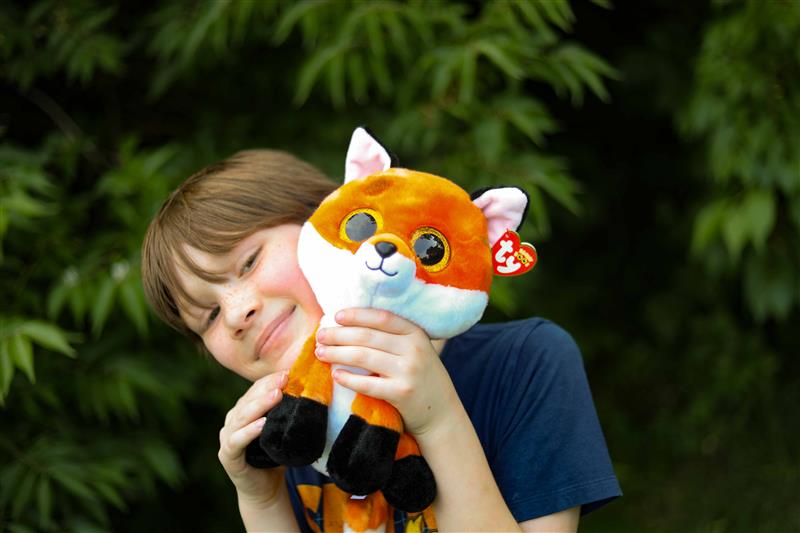Cozy Companions: The Benefits of Stuffed Animals for Kids

For generations, stuffed animals for kids have been a source of comfort and joy. Even in our current era of screens and high-tech toys, there's still something special and timeless about a soft, cuddly plush you can hold close. Whether it’s a snuggly puppy dog plushie or a colorful plush unicorn, stuffed animals have long been cherished companions for children across generations. But beyond being adorable and comforting, these cozy friends play an important role in a child's emotional and developmental growth.
Reasons to Love Stuffed Animals for Kids
The benefits of stuffed animals for kids (and adults) are numerous. Much research has been done on the positives of plushies, from their ability to help reduce pain in children after surgery to their role in promoting positive sleep behavior. These cozy companions offer comfort, connection, and developmental support in ways both big and small.
1. Emotional Support and Comfort
First and foremost, one of the most significant benefits of stuffed animals for kids is that they provide emotional comfort.. These soft toys are a source of security, especially during times of stress or change, like moving to a new home, the night before the first day of school, or visiting the doctor. Hugging a familiar plush friend, like an easy-to-squeeze Squishy Beanie, can help calm anxiety by promoting feelings of safety and stability.
2. Encouraging Imaginative Play
Stuffed animals are perfect for sparking imaginative, creative playtime. Children often assign names, personalities, and even voices to their plush companions. This kind of pretend play fosters creativity, storytelling skills, and social-emotional understanding. Through role-play with their soft toys, kids practice empathy, communication, and problem-solving. Stuffed animals inspired by zoo plush animal favorites like koalas, elephants, and sloths, or marine plushie buddies like otters and octopuses, can also introduce kids to wildlife conservation and a deeper connection to animals and their habitats.
3. Building Independence and Confidence
Soft toys can also help children develop independence. These companions act as emotional anchors, assisting kids to navigate new experiences with a sense of familiarity and reassurance. When a child has a stuffed animal by their side, they may feel more confident sleeping alone, exploring new environments, or attending daycare. Familiar plush pals like dogs, cats, or farm animals, like cows and sheep, can be especially comforting.
4. Supporting Emotional Expression
Young children often struggle to express complex emotions. A stuffed animal can act as a non-judgmental friend that allows kids to voice their feelings freely. This safe space to confide feelings helps kids explore emotions like sadness, anger, or excitement in a safe and healthy way. This practice of utilizing emotional support stuffed animals for kids assists in laying the groundwork for emotional intelligence and self-awareness.
5. Enhancing Language and Social Skills
Engaging in conversations with stuffed animals may seem like simple play, but it's beneficial for language development. Children often mimic real-life discussions while interacting with their toys, helping them practice vocabulary, sentence structure, and communication. These interactions also prepare them for social relationships in the real world. For example, woodland stuffed animals like foxes, owls, or raccoons can also inspire kids to name and describe animals they see on walks in nature, encouraging them to expand their vocabulary.
6. Ideal Sleep Companions
For many kids, bedtime just isn’t the same without their favorite plush toy. Having a trusted stuffed animal nearby helps create a comforting sleep routine. Super-soft plush like Beanie Bellies offer soothing texture, while imaginative companions like a plush dragon can give kids a sense of protection as they drift off to sleep. A well-loved toy's soft texture and familiar scent can make bedtime feel safer, more predictable, and less lonely.
7. Long-Term Keepsakes and Memory Holders
Beyond childhood, stuffed animals often become cherished keepsakes. They hold childhood memories, comfort during hard times, and symbols of love from parents or friends. Think about the nostalgia evoked from growing up with Beanie Babies. This emotional value can last a lifetime, making them much more than just toys.
The Overall Benefits of Soft Toys & Plush Animals
The benefits of soft toys go far beyond playtime. From nurturing emotional well-being to encouraging cognitive development, the best stuffed animals for kids are invaluable companions. So, the next time you see a child cuddling a tattered teddy bear or whispering secrets to a plush bunny, know that there’s a lot more happening than meets the eye. These cozy companions are quietly helping children grow into more confident, caring, and expressive individuals.